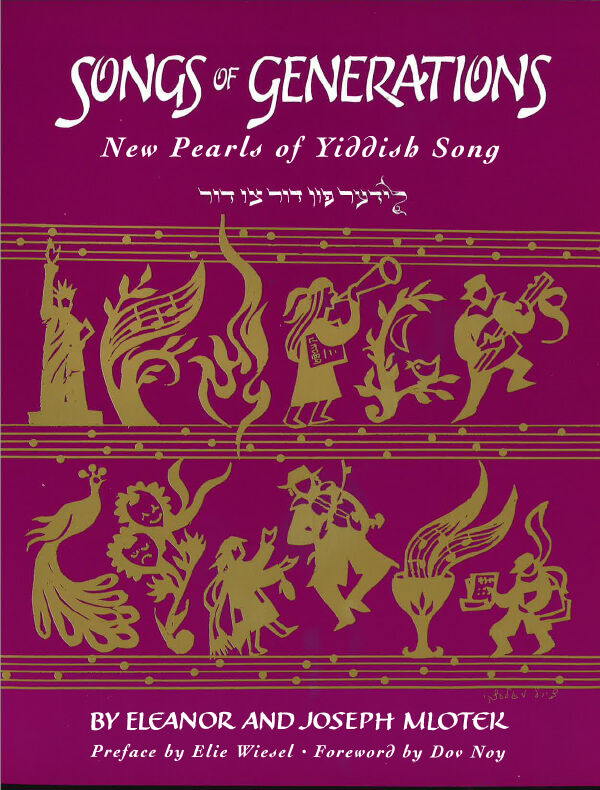Words and music by Galician Yiddish folk poet Nokhem Sternheim (1879-1942) – killed by the Nazis – author of popular Yiddish songs like “Hobn mir a nigndl,” “Fraytik oyf der nakht,” and “Tayere Malkele.” The song was in the repertoire of singer Diana Blumenfeld. Aaron Feiner, Toronto, sent us a recording of his version which we are printing here. Other variants were submitted by Sara Rosenfeld, Chana Gonshar and Chaika Spigel, Montreal.

In the narrow alleyway,
near a water barrel,
there stands a girl.
A young man is hanging around
a lad with a belted overcoat
twirling his peyes and hovering.
He’s holding a book of the Talmud,
and thinking, thinking about Sorele,
and whether she has noticed him here.
He steals a glance towards the barrel,
and trembles in the alley.
wondering if anyone might have seen him…
Sorele, Sorele, Sorele…
what kind of force, what power [you have over me]
Sorele, Sorele, Sorele,
I dream of only you, day and night.
In the narrow alleyway,
in the water barrel,
the girl looks in the mirror, thinking
of the rabbi’s son.
The young man with the peyes
who smiled at her and laughed.
Shloymele, Shloymele, Shloymele…
what kind of force, what power
Shloymele, Shloymele, Shloymele,
I dream about you day and night.
The little tailor, Reb Urele
wants to get his Sorele betrothed,
but he has no money.
He pawns his coats,
takes the few zlotys
and goes with her to the Rebbe.
Sitting there is a young tsadik,
Reb Shloymele in a fur hat,
He has been taking fees for advice for a long time.
The young Rebbe trembles
as he accepts the tailor’s donation
and dreamily and quietly he murmurs:
It’s Sorele, Sorele, Sorele, after all.
What kind of power do you have over me?
Shloymele, Shloymele, Shloymele,
I dream about you day and night.
In dem shmoln gesele,
Bay a vaser-fesele,
Shteyt a meydl, dortn shteyt;
Es dreyt zikh dort a bokherl,
A bagartlt zokherl,
Krayzlt zikh di peyelekh un dreyt.
Er halt in hant a g’morele
Un trakhtn, trakht fun Sorele,
Tsi zi hot im shoyn do gezen.
Er varft a blik tsum fesele,
Un tsitert oyf in gesele,
Tsi s’hot im keyner dortn nisht gezen. . .
Sorele, Sorele, Sorele. . .
Vos iz dos far a koyekh, far a kraft?
Sorele, Sorele, Sorele,
lkh kholem nor fun dir tog un nakht.
Ir tate iz a shnayderl
In dem shmoln kheyderl,
Zitst bay a tishele un neyt.
Nisht vayt fun shnayders hayzele
Gefint zikh dem rebns klayzele,
Dreyt zikh dort dos meydele, zikh dreyt.
In dem shmoln gesele,
In der vaser-fesele,
Shpiglt zikh dos meydele un trakht
Fun dem rebns bokherl
Mit peyelekh dem zokherl
Vos hot tsu ir geshmeykhlt un gelakht.
Shloymele, Shloymele, Shloymele. . .
Vos iz es far a koyekh, far a makht?
Shloymele, Shloymele, Shloymele,
lkh kholem vegn dir tog un nakht.
Dos shnayderl Reb Urele
Farknasn vil zayn Surele
Nor keyn mezumen hot er nit,
Farzetst er di kapotkelekh
Nemendik di zlotkelekh
Un er fort mit ir tsu a gutn yid.
Zitst zikh dort a tsadikl,
Reb Shloymele in spodikl,
Pidyoynes nemt er shoyn a lange tsayt.
Tsitert oyf der rebenyu,
Ven er nemt dem shnayders pidyen tsu
Farkholemt un er murmlt shtilerheyt. . .
– S’iz dokh Sorele, Sorele, Sorele,
Vos iz es far a koyekh, far a makht?
– Shloymele, Shloymele, Shloymele,
lkh kholem vegn dir tog un nakht
אין דעם שמאָלן געסעלע,
בײַ אַ װאַסער-פֿעסעלע,
שטײט אַ מײדל, דאָרטן שטײט;
עס דרײט זיך דאָרט אַ בחורל,
אַ באָגאַרטלט זכרל,
קרײַזלט זיך די פֿאהלעך און דרײט.
ער האַלט אין האַנט אַ גמראלע
און טראַכטן, טראַכט פֿון שׂרהלע,
צי זי האָט אים שױן דאָ געזען.
ער װאַרפֿט אַ בליק צום פֿעסעלע,
און ציטערעט אױף אין געסעלע,
צי סיהאָט אים קײנער דאָרטן נישט געזען..
שׂרהלע, שׂרהלע, שׂרהלע. ..
װאָס איז דאָס פֿאַר אַ כּוח, פֿאַר אַ קראַפֿט?
שׂרהלע, שׂרהלע, שׂרהלע,
איך חלום נאָך פֿון דיר טאָג און נאַכט.
איר טאַטע איז אַ שנטדערל
אין דעם שמאָלן חדרל,
זיצט בײַ אַ טישעלע און נײט.
נישט װײַט פֿון שנײַדערס הײַזעלע
געפֿינט זיך דעם רבינס קלײַזעלע,
דרײט זֹיך דאָרט דאָס מײדעלע, זיך דרײט.
אין דעם שמאָלן געסעלע,
אין דער װואַסער-פֿעסעלע,
שפֿיגלט זיך דאָס מײדעלע און טראַכט
פֿון דעם רבינס בחורל
מיט פֿאהלעך דעם זכרל
װאָס האָט צו איר געשמײכלט און געלאַכט.
שלמהלע, שלמהלע, שלמהלע. . .
װאָס איז עס פֿאַר אַ כּוח, פֿאַר אַ מאַכט?
שלמהלע, שלמהלע, שלמחלע,
איך חלום װעגן דיר טאָג און נאַכט.
דאָס שנײַדערל רי אורעלע
פֿאַרכּנסן װיל זײַן שׂרהלע,
נאָר קײן מזומן האָט ער ניט,
פֿאַרזעצט ער די קאַפֿאָטקעלעך,
נעמענדיק די זלאָטקעלעך
און ער פֿאָרט מיט איר צו אַ גוטן ייִד.
זיצט זיך דאָרט אַ צדיקל
רי שלמהלע אין ספֿאָדיקל
פּדיונית נעמט ער שױן אַ לאַנגע צײַט,
ציטערט אױף דער רביניו,
װען ער נעמט דעם שנײַדערס פּדיון צו
פֿאַרחלומט און ער מורמלט שטילערהײט. . .
– סיאיז דאָך שׂרהלע, שׂרהלע, שׂרהלע,
װאָס איז עס פֿאַר אַ כּוח, פֿאַר אַ מאַכט?
– שלמהלע, שלמהלע, שלמהלע,
איך חלום װעגן דיר טאָג און נאַכט.
Song Title: Sorele

The Songs of Generations: New Pearls of Yiddish Song anthology comprises songs that were either never printed before or appeared in rare and inaccessible publications — sometimes in different versions and without proper sources. Most of the songs in this book were submitted by readers of Chana and Yosl’s column “Perl fun der yidisher poezye” (Pearls of Yiddish Poetry) in the Yiddish newspaper Der Forverts (The Forward), initiated in October, 1970. Over 25 years, thousands of songs were collected in correspondence and on cassettes from readers throughout the world, and they represent a veritable national Yiddish song archive. Chana Mlotek, in her introduction, writes, “In the course of years the inquiries, contributions and enthusiasm of these readers have kept our own interest unflagging and have reinforced our dedication to this effort. And in recent years our participants have also been augmented by new readers from the former Soviet Russia, who receive our newspaper there or from newly-arrived immigrants in this country and Israel.”